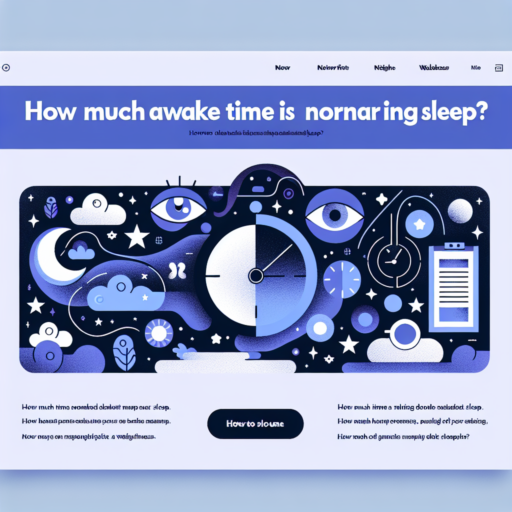What is the average awake time during sleep on Fitbit?
Understanding your sleep patterns is essential for improving overall sleep quality, and devices like Fitbit offer invaluable insights into how we rest. One of the key metrics measured by Fitbit is the average awake time during sleep. This refers to the periods throughout the night when you’re not in a state of sleep, including all the times you’re fully awake, as well as those moments when you’re just tossing and turning. It’s a crucial indicator of sleep disruption and quality.
The average awake time during sleep varies widely among individuals, depending on various factors such as age, activity level during the day, stress levels, and overall health. Typically, it’s considered normal to have brief awakening periods of 10-30 minutes in total during the night. However, with tools like Fitbit, users can monitor their patterns over time to identify any irregularities or trends. By tracking this data, Fitbit wearers gain a clearer understanding of their sleep efficiency, which is the ratio of the total time spent asleep to the total time spent in bed.
For Fitbit users, deciphering this information can lead to actionable insights. For instance, high average awake times might suggest underlying sleep disorders, such as insomnia or sleep apnea, or even highlight the impact of lifestyle choices on sleep quality. Therefore, observing and understanding these metrics can be a critical step towards achieving better sleep health. Fitbit’s user-friendly interface and detailed sleep reports make it easier for users to note changes and patterns, ultimately helping them to adjust their habits for improved rest.
How many times waking up at night is normal?
Understanding the normal frequency of waking up during the night is crucial for assessing our sleep health. While it’s common to wake up once or twice, several factors can influence these numbers. It’s essential to differentiate between momentarily waking and having prolonged periods of wakefulness. Momentary awakenings, often forgotten by morning, are a normal part of the sleep cycle.
Individual Differences and Sleep Cycles: Everyone’s sleep needs and patterns differ, influenced by age, lifestyle, and health conditions. Adults typically pass through multiple sleep cycles a night, each lasting about 90 minutes. It is during the transitions between these cycles that one might briefly wake.
Concerns arise when waking up becomes too frequent or too prolonged, potentially disrupting the restorative nature of sleep. It might indicate underlying health issues or poor sleep hygiene. Monitoring the frequency and duration of nighttime awakenings can be a step towards improving sleep quality and overall health.
What does a healthy sleep cycle look like?
A healthy sleep cycle, also known as a sleep pattern, is a vital aspect of our overall health and well-being. It’s commonly segmented into various stages, ranging from light sleep to deep REM (Rapid Eye Movement) sleep. Each of these stages plays a crucial role in ensuring that your body and mind are well-rested and rejuvenated for the next day.
Understanding the Stages of a Healthy Sleep Cycle
The sleep cycle consists of four to five cycles per night, each lasting about 90 to 120 minutes. A typical cycle includes the following stages:
- Stage 1: This is the light sleep stage where you can be easily awakened but are starting to wind down.
- Stage 2: During this stage, your body begins to prepare for deep sleep. Your heart rate slows, and body temperature drops.
- Stage 3: Often referred to as deep sleep, this stage is crucial for physical recovery and growth. It’s harder to wake someone from this stage of sleep.
- REM Sleep: The final stage is where most dreaming occurs, your eyes move rapidly, and brain activity increases. This stage is essential for emotional regulation and memory consolidation.
The transition through these stages is seamless, with each phase preparing you for the next. Ideally, a healthy sleep cycle should incorporate all these stages in a balanced manner. Getting ample REM and deep sleep is particularly critical as it ensures mental acuity and physical health.
Is it normal to wake up 2-3 times a night?
Waking up 2-3 times a night can be a common experience for many individuals. It’s important to understand that there are various factors that can influence nighttime awakenings. These disruptions can range from external stimuli to specific sleep disorders. However, occasional awakenings are not always a sign of a serious problem.
One of the primary reasons for waking up frequently at night can be linked to the natural sleep cycle. During the night, a person cycles through different stages of sleep, including deep sleep and REM (rapid eye movement) sleep. It’s during the lighter stages of sleep that one is more likely to wake up. These brief awakenings are often so short that most people do not remember them in the morning.
Environmental factors can also play a significant role in how often you wake up at night. Noise, light, and temperature can all disrupt sleep. For example, ambient noise from traffic or a snoring partner can cause you to wake up multiple times. Similarly, a room that’s too hot or too cold can interfere with your sleep quality. Making adjustments to your sleeping environment may help reduce the frequency of nighttime awakenings.
Stress and anxiety are other common causes of disturbed sleep. It’s well-documented that stress can significantly impact your sleep pattern, leading to multiple awakenings during the night. Techniques such as mindfulness meditation or deep breathing exercises before bedtime may help in fostering a more restful night’s sleep.










